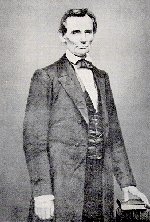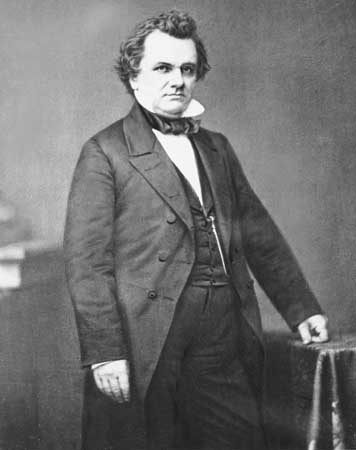One
expects NPS links to be stable, but one apparently cannot count
on that. So, here I provide my own text, in my own format,
using the material in this book,
which was published in 1860 and can be found on the
Internet Archive. (I fully expect that link to go bad on
me shortly after I first publish this page, so full
bibliographic information is provided here.)
The advantage of this book is that it contains the
correspondence that set up the debates, as well as the speeches
given by the two candidates in Chicago and other locations,
prior to the debate arrangements being made. The rules of
the debates were much different than those we see from
politicians today:
One candidate opened with an hour-long speech; the second
candidate then was allowed an hour and a half to reply, and then
the first candidate got a half-hour rejoinder.
Senator Douglas gave the opening speech at the first debate
(Ottawa), and after that they alternated. A good book on
the debates is Lincoln and Douglas: The Debates
that Defined America, by Allen C.
Guelzo. A more recent book is The
Lincoln-Douglas
Debates: The First Complete, Unexpurgated Text, by Harold
Holzer.
Each individual entry below gives a brief (but not exhaustive)
outline of the major topics discussed in that joint appearance
(as well as the full text of all three speeches), but it must be
admitted that both men spent a lot of time deflecting trivial
points advanced by the other.
There are no standard texts for the debates,
alas. Both men prepared remarks, but since much of
what was said was in response to what the other man had said, a
lot was extemporaneous. The texts that we have were
derived from the shorthand transcripts of several reporters
covering the debates for various newspapers. See the
Guelzo or Holzer books for more details on this. As
for the book I used, here is a letter from Lincoln to the
publisher (Lincoln's use of "his friends" and "Douglas's
friends" refers to newspapers friendly to and endorsing one man
or the other) outlining his choice of sources.
LETTER FROM MR. LINCOLN,
In response to a request of the
Republican State Central Committee, the Board of Equalization,
and Republican State Officers of Ohio, requesting for
publication copies of the Speeches made in the Illinois Campaign
of 1858, Mr. Lincoln made the following reply :
Springfield, Ills., Dec. 19, 1859.
Messrs. Geo.
M. Parsons, and others, Central Executive Committee, etc.:
Gentlemen—Your letter of the
7th inst., accompanied by a similar one from the Governor
elect, the Republican State officers, and the Republican
members of the State Board of Equalization of Ohio, both
requesting of me, for publication in permanent form, copies of
the political debates between Senator Douglas and myself last
year, has been received. With my
grateful acknowledgments to both you and them for the very
flattering terms in which the request is communicated, I
transmit you the copies. The
copies I send you are as reported and printed, by the
respective friends of Senator Douglas and myself, at the
time—that is, his by his friends, and mine by mine.
It would be an unwarrantable liberty for us to change
a word or a letter in his, and the changes I have made in
mine, you perceive, are verbal only, and very few in number. I
wish the reprint to be precisely as the copies I send, without
any comment whatever.
Yours, very truly,
A. LINCOLN.
|


